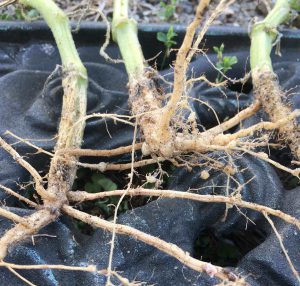Does this sound familiar? You buy some great looking veggie transplants, or maybe some flowering annuals for the garden. Or perhaps you’ve started some plants from seeds. You give them all the right care, but they seem to constantly look sad and wilted, no matter how wet the soil is. Or maybe they refused to grow, stalling in a permanent stunted state. Don’t despair. You’re not alone, and you may not have a terrible “brown thumb.” But… you might have worms.

Eww. Not like that.
The nematode nemeses…
Our Jurrassic-sized lubber grasshoppers may get all the attention, but many plants grown in our sandy Florida soils have much bigger problems from microscopic pests called nematodes. These tiny microscopic worms affect a plant’s root system, making it extremely difficult for the plant to take up water and nutrients, even when abundantly available in the surrounding soil. This can cause serious struggles for a plant, especially as the weather gets hotter.
(And because a nematode-infested plant frequently looks desperately thirsty, a well-meaning gardener will often actually hasten its demise by drastically overwatering in a futile attempt to get it to perk back up…)
Signs & symptoms
The most obvious sign that you have nematode issues will be if you yank out sad, wilted plants and find stunted, stubby, knotted, and/or gall-ridden roots, like these:

Ok, so I think I might have nematodes. What can I do?
If you’ve got major nematode issues, there are a few things you can do to improve your success rate. One of the best strategies starts with plant selection – Be sure to choose varieties of plants that are either nematode-resistant or nematode-tolerant. (This will involve a little extra research before buying seeds or plants, but you’ll save yourself time and disappointment later on.)
TIP: Take a look around your neighborhood to see which plants look like they’re struggling vs. thriving. If every single plant of a certain variety is looking sad, it probably won’t like your yard either!
Practicing “soil solarization” in a veggie bed can temporarily reduce nematode populations. So during the hottest months, you might consider giving the veggie gardening a rest in that area, and work on getting them ready for the big fall/winter growing season.
(Side-note: Nematode “resistance” is sometimes temperature-dependent, so even a “resistant” variety that performs well during cooler months may struggle and wilt once the weather gets too hot. Learn to recognize when it’s time to pull a plant, rather than letting it struggle and building up your nematode populations!)
Adding lots of organic matter (compost, chopped marigolds, etc.) can sometimes help plants cope with nematode infestations. (For more info, check out this blog post and this site.) But if your nematode issues are severe enough, container gardening or hydroponics may be better options, rather than trying to drastically alter your soil conditions.
What about landscape plants?
Yes – your landscape plants can struggle with nematodes too! Resistance and/or tolerance are critical, especially for long-lived perennials, shrubs, trees, and turf. (Even for short-lived annuals, nematodes can drastically affect health & performance.)
If you’ve had issues with a certain type of shrub/tree/turf/flower, and you suspect nematodes may have been to blame, it would be worth examining alternative options, rather than simply replacing plant material with more of the same, again and again…
Ready to learn more about nematodes, soil solarization, and plant selection for resistance/tolerance?
Links for more in-depth information can be found at: http://gardeningsolutions.ifas.ufl.edu/care/pests-and-diseases/pests/nematodes.html
Want help determining what’s “bugging” your plants? Your local UF/IFAS Extension office and Master Gardeners are here to help, throughout the state! Click to find your local office!
About UF/IFAS Extension:
UF/IFAS Extension serves as a source of non-biased, research-based information for the residents, businesses, and communities of Florida, providing educational materials and programs for adults and youth. We proudly bring UF directly to YOU.
About the Author: As the Florida Friendly Landscaping (FFL) Program Coordinator in Pasco County, I work with the residents, homebuilders, and businesses of Pasco to help create attractive landscapes that DON’T require a lot of water, fertilizer, and pesticides. Through an innovative collaboration with Pasco County Utilities, the Pasco County FFL Program also provides on-site troubleshooting assistance to individuals and communities identified as high water users. My motto is – “Less guesswork, better landscapes.” I can be reached at fgaldo@ufl.edu
Thirsty for more FFL knowledge? Don’t forget to follow us on Facebook & Twitter!
UF/IFAS Extension Is An Equal Opportunity Institution.
by Frank Galdo
 0
0

